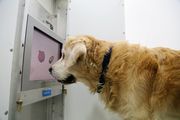Barks Blog
Teach Old Dogs New Games

The articles describing the related study don’t go into details on what these Lumosity-like brain games for dogs entail (and I haven’t gotten hold of the full study yet), but that’s almost beside the point. The premise of the study is something that trainers should take and run with — in all different directions. It’s simple and should be obvious: Older dogs need — and benefit greatly from — mental stimulation and training, but most dog owners don’t really do much training with older dogs.
The study abstract says, “Previous studies have shown that aging can be slowed by mental and physical stimulation, and thus stopping these activities might actually lead to faster aging in dogs, which can result in a reduction in the quality of life of the animal, and may even decrease the strength of the dog-owner bond.”
The flipside of that, of course, is that continuing to engage with older dogs is good for the dogs’ health and for the human-dog relationship. Seems obvious. I’m not convinced that computer games are the way to go; like anything, they will appeal to some dogs and hold no interest for others. It’s an intriguing possibility that I would love to explore. But there’s lots in our toolboxes already that we can adapt for seniors.
Some dog sports, like agility or dock diving, might be beyond the capabilities of, say, an arthritic golden retriever (as my dog, Jana was during her last years). But others, like nose work or Rally, can easily work for older dogs. Jana took nose work at about age 12 — and loved every second (well, except for the seconds that other dogs got to be in the ring with the treats and she had to watch). The instructor, at the beginning of the first class, told us handlers that the dogs could bark as much as they wanted and we were not to use the ‘N’ word. (No.) Jana had found her doggy paradise.
Throughout her life and well into old age, Jana’s mind was sharp and, if a cookie-earning opportunity arose, she’d stick with the challenge until she’d earned and eaten every last crumb. We did exercises on canine fitness equipment, practiced imitation games, and worked with picture cards that Jana could choose: ball, tug toy, popsicle. I never thought of teaching her to use a computer, but I am sure she’d have mastered that as well.
But my main takeaway from the dogs and computers study has nothing to do with whether dogs want to, need to, or should learn to use computers, though. It is all about us: Don’t give up on older dogs in class; encourage clients to bring their older dogs to appropriate classes or to sessions geared specifically toward less physically active dogs. Figure out ways to adapt activities for senior dogs’ changing physical needs. Continued mental stimulation — for the dogs as well as for the humans trying to figure out new ways to challenge their dogs — will have all sorts of benefits!

